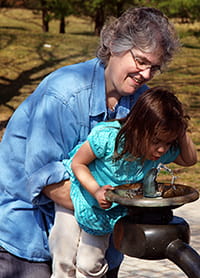The Challenge: Strangulated Bowel
In the summer of 2003, Deena Schneider had gastric bypass surgery.
“I was overweight all of my life. [After the surgery] I was finally losing weight and doing well, but then two years after, I started getting extremely sick,” says Deena.
Deena thought her issues were related to dumping syndrome, a group of symptoms that is most often associated with gastric bypass surgery. However, one night her pain was so unbearable that her husband insisted they go to the emergency room.
The decision saved Deena’s life, because that night she underwent emergency surgery for a strangulated bowel, a rare complication of bariatric surgery.
Deena woke up with an ileostomy bag and was being fed by total parenteral nutrition (TPN) through a catheter because she could no longer absorb any nutrition.
“I lived on TPN for three-and-a-half years, pumping every single night for 12 hours. During that time, I was in and out of the hospital with a lot of infections and issues,” she says.
The Path to the UPMC Gastrointestinal Rehabilitation and Transplant Program
Deena's gastroenterologist in Allentown, Pa., explained that being on TPN for a long duration of time was damaging her liver. He, as well as her other doctors, told her that eventually she would die from the damage and complications caused by the strangulated bowel.
He researched alternatives, such as a liver or an intestinal transplant, and then discovered information about the Gastrointestinal Rehabilitation and Transplant Program at UPMC.
“UPMC was one of the few places in the world that had done small intestine transplants and had a good record, so we called. A transplant coordinator contacted me to make an appointment. I scheduled weeks of testing. Since I was coming from out of town, we had to stay locally for several weeks.”
The Solution: Intestinal Surgery and Rehab
Though Deena originally thought that an intestinal transplant would be necessary, after further testing, the doctors formulated a plan for intestinal surgical rehabilitation. From there, things moved quickly for Deena and her recovery.
“After the surgery, I was in the hospital for a little over a week to stabilize. I was off TPN immediately following the procedure, and the doctors fought to get me home for Christmas. Then I had to return for follow-up testing every week or so until they felt I was stable,” says Deena.
With bariatric surgery, the stomach reduces in size. The Gastrointestinal Rehabilitation and Transplant Program surgeon reconstructed and enlarged her stomach, and then reconnected what was left of her small intestine.
Though Deena was off TPN completely, she worked closely with an Gastrointestinal Rehabilitation and Transplant Program dietitian before returning home to learn what to eat, when to eat, and how often. As a result of the reconstruction, she since takes note of her food intake to help track the effects of what she consumes on a daily basis.
“My coordinator always followed up with my testing," says Deena. "Everyone there was absolutely wonderful and really helped to educate me.”
The Results: Living a "Normal" Life
Before Deena came to UPMC, she wore an ostomy bag that was exposed outside her clothes everywhere she went.
“My granddaughter was born during that time. I was unable to hold her or play with her for the first year of her life. She was too heavy and squirmy for me," says Deena. "Now, I can lift her, play and run around with her and my grandson because of the reconstructive surgery.”
She still learns daily what foods her body can and can’t handle and is on a medication that helps her bowels react in the proper way.
“People need to look into what is causing their symptoms and should not stop looking for an answer," says Deena. "I got into this mode that there was no way to reverse things, as that is what my local doctors were telling me. But when I talked with the doctors [at the Gastrointestinal Rehabilitation and Transplant Program] they took on the challenge to give me a pretty normal life back again. It was amazing what they accomplished for me.”
After Deena returned to Allentown, she bought a circular necklace that says, “I believe in miracles.”
“I wear it every single day to remind myself just how far I have come. I would not be alive today if it weren’t for the UPMC doctors. And to think I have a pretty ‘normal’ life now blows me away! Thank you to UPMC and the team at Gastrointestinal Rehabilitation and Transplant Program from the bottom of my heart!”
Note: Deena's treatment and results may not be representative of all similar cases.
Learn More About Intestinal Transplant and Bariatric Surgery
UPMC Transplant Services:
UPMC HealthBeat:

















